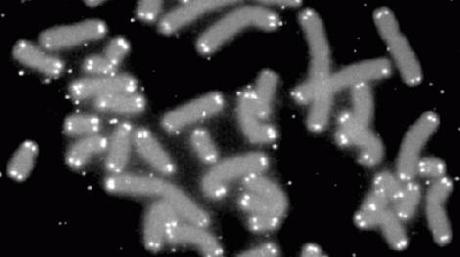Scientists claim to be a step closer to reversing the aging process after rejuvenating worn out organs in elderly mice. The experimental treatment developed by researchers at the Dana-Farber Cancer Institute, Harvard Medical School, turned weak and feeble old mice into healthy animals by regenerating their aged bodies.
It’s a massive discovery, but it won’t be able to be used in humans yet without some pretty scary consequences.
The Harvard study focused on part of the cell division process called ‘telomere shortening.’ If you picture a chromosome as an X-shaped unit of DNA, the telomeres are the little caps at the end of each strand.
As cells divide, their DNA splits in half to form two new cells – but a bit of genetic information is lost at the end of each strand with each division. That’s what telomeres are for – they contain a bunch of useless DNA that acts as a buffer zone so that no important DNA is lost from our chromosomes. Gradually, over time, the telomere erodes away to a level where each cell division actually starts destroying bits of important DNA – and this gets to a point where the cell can no longer reproduce itself. You can imagine what that starts doing to bodily organs as time goes by.
So in a way, telomeres are there as a built-in limit to how many times a cell can divide itself – they’re part of the built-in biological clock that causes aging, body deterioration and death.
“What we saw in these animals was not a slowing down or stabilization of the aging process. We saw a dramatic reversal – and that was unexpected,” said Ronald DePinho, who led the study, which was published in the journal Nature. ”This could lead to strategies that enhance the regenerative potential of organs as individuals age and so increase their quality of life. Whether it serves to increase longevity is a question we are not yet in a position to answer.”
Ronald DePinho and a team of Harvard colleagues experimented on mice to see what happens when steps are taken to stop telomeres from shortening.
The group looked at the enzyme telomerase, which can replenish the telomere after replication and effectively lengthen it so that a cell can live for longer.
They bred a group of genetically-engineered mice that lacked the ability to produce telomerase – and watched as these mice showed rapid and very early onset symptoms of aging.
Then, they gave the mice injections to re-activate the telomerase enzyme – expecting to see the aging process slow down to normal levels. Instead, they watched in astonishment as the mice appeared to age backwards, their withered organs repairing themselves even to the point of new neurons beginning to sprout in their brains.
In essence, repairing the telomeres seemed to be able to reverse the aging process and make the mice physiologically younger, despite already suffering the ravages of age.

Repeating the trick in humans will be more difficult. Mice make telomerase throughout their lives, but the enzyme is switched off in adult humans, an evolutionary compromise that stops cells growing out of control and turning into cancer. Raising levels of telomerase in people might slow the aging process, but it makes the risk of cancer soar.
DePinho said the treatment might be safe in humans if it were given periodically and only to younger people who do not have tiny clumps of cancer cells already living, unnoticed, in their bodies.
Although a telomerase-activating compound was recently discovered, telomerase rejuvenation in adults is directly linked to the development and spread of cancers throughout the body – so while a telomerase-based anti-aging treatment might produce valuable results in older humans, scientists also believe it would kick the risk of cancer up several orders of magnitude.
So the study isn’t the sort of breakthrough that will lead directly and immediately to any sort of treatment for humans – but it’s another step forward in science’s inevitable march towards human immortality. Imagine what a gift it would be for an 80-year-old to be given an injection that could tell the cells in his body to rebuild itself in the physical health he enjoyed as a 25-year-old, knowing everything he knows.
Would you have this procedure?
N.
Via: The Guardian

